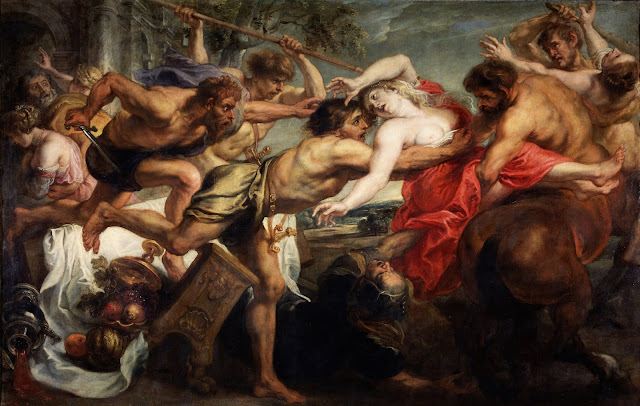SOME say that Peirithous the Lapith was the son of Ixion and Dia, daughter of Dioneus; others, that he was the son of Zeus who, disguised as a stallion, coursed around Dia before seducing her.
b. Almost incredible reports of Theseus’s strength and valour had reached Peirithous, who ruled over the Magnetes, at the mound of the river Peneus; and one day he resolved to test them by raiding Attica and driving away a herd of cattle that were grazing at Marathon. When Theseus at once went in pursuit, Peirithous boldly turned about to face him; but each was filled with such admiration for the other’s nobility of appearance that the cattle were forgotten, and they swore an oath of everlasting friendship.
c. Peirithous married Hippodameia, or Deidameia, daughter of Butes-or, some say, of Adrastus-and invited all the Olympians to his wedding, except Ares and Eris; he remembered the mischief which Eris had caused at the marriage of Peleus and Thetis. Since more guests came to Peirithous’s palace than it could contain, his cousins the Centaurs, together with Nestor, Caeneus, and other Thessalian princes, were seated at tables in a vast, tree-shaded cave near by.
e. Peirithous and his paranymph Theseus sprang to Hippodameia’s rescue, cut off Eurytion’s ears and nose and, with the help of the Lapiths, threw him out of the cavern. The ensuring fight, in the course of which Caeneus the Lapith was killed, lasted until nightfall; and thus began the long feud between the Centaurs and their Lapith neighbours, engineered by Ares and Eris in revenge for the slight offered them.
f. On this occasion the Centaurs suffered a serious reverse, and Theseus drove them from their ancient hunting grounds on Mount Pelion to the land of the Aethices near Mount Pindus. But it was not an easy task to subdue the Centaurs, who had already disputed Ixion’s kingdom with Peirithous, and who now, rallying their forces, invaded Lapith territory. They surprised and slaughtered the main Lapith army, and when the survivors fled to Pholoë in Elis, the vengeful Centaurs expulsed them and converted Pholoë into a bandit stronghold of their own. Finally the Lapiths settled in Malea.
4. It was during Theseus’s campaign against the Centaurs that he met Heracles again, for the first time since his childhood; and presently initiated him into the Mysteries of Demeter at Eleusis.
***
1. Both Lapiths and Centaurs claimed descent from Ixion, an oak-hero, and had a horse cult in common. They were primitive mountain tribes in Northern Greece, of whose ancient rivalry the Hellenes took advantage by allying themselves first with one, and then with the other. Centaur and Lapith may be italic words: centuria, ‘war-band of one hundred’ and lapicidae, ‘Psintchithpers’. (The usual Classical etymology is, respectively, from centtauroi, ‘those who spear bulls’, and lapizein, ‘to swagger’.) These mountaineers seem to have had erotic orgies, and thus won a reputation for promiscuity among the monogamous Hellenes; members of this Neolithic race survived in the Arcadian mountains, and on Mount Pindus, until Classical times, and vestiges of their pre-Hellenic language are to be found in modern Albania.
3. Whether Ixion or Zeus was Peirithous’s father depended on Ixion’s right to style himself Zeus. The myth of his parentage has evidently been deduced from an icon which showed a priestess of Thetis-Dia, daughter of Dioneus, ‘the divine daughter of the seashore’-halter in hand, encouraging the candidate for kingship to master the wild horse. Hippodameia’s name (‘horse-tamer’) refers to the same icon. Zeus, disguised as stallion, ‘coursed around’ Dia, because that is the meaning of the name Peirithous; and Ixion, as the Sun-god, spread-eagled to his wheel, coursed around the heavens.

Comments
Post a Comment